You’ve seen the breathtaking videos. Graceful divers slipping beneath the surface, exploring coral gardens, moving like sea creatures in slow motion. Maybe you’ve stumbled into FreedivingTok, where every scroll convinces you this might be your next big thing. Don’t worry, the algorithm plays me too.
But freediving isn’t just about looking cool underwater or chasing aesthetic reels. It’s a full-body, soul-deep kind of magic. Whether you’re floating near the surface or learning to hold your breath just a little longer, the benefits of freediving are real, and they’re powerful.
Freediving transforms more than just your Instagram feed. It transforms you. From building physical strength to calming your inner chaos and even rewiring how you relate to nature and yourself, freediving gives you more than a thrill. It gives you clarity, courage, and connection.
In this post, I’ll share the three most powerful freediving benefits that stick with you long after the ocean lets you go.
What is Freediving?
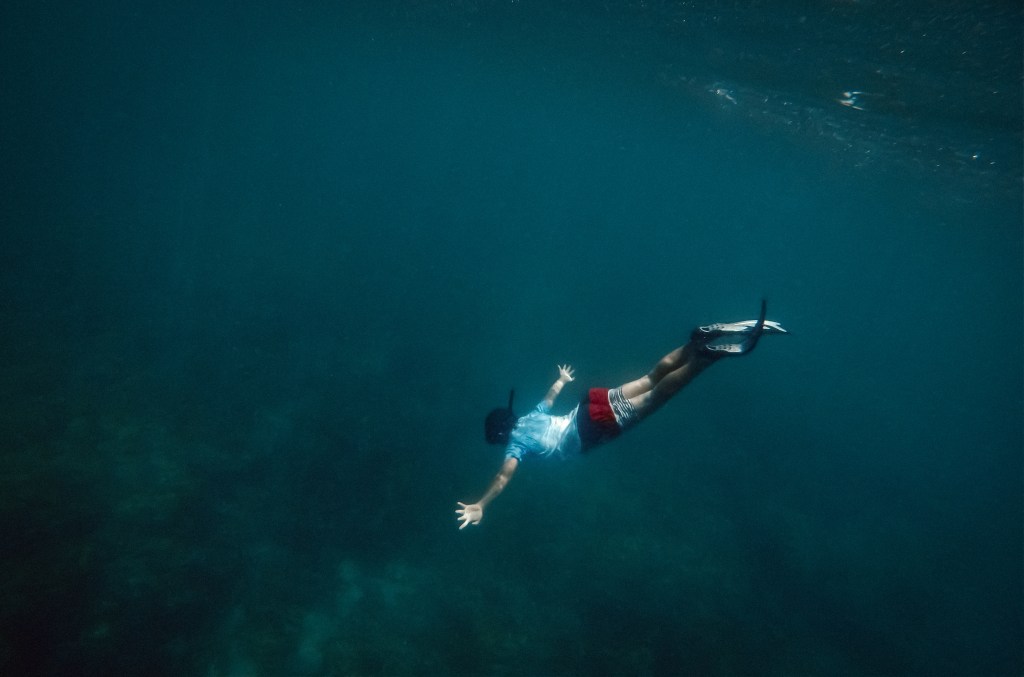
At its simplest, freediving is holding your breath and exploring the underwater world. No tanks, no bubbles, just you and the ocean. It’s often called apnea diving, and it’s been practiced for centuries by cultures who’ve relied on the sea for survival, connection, and sometimes even spirituality.
Unlike scuba diving, where you carry your air with you, freediving challenges you to slow down, breathe with purpose, and become weightless on your own terms. It’s a mix of physical control, mental calm, and deep trust in your body.
But don’t worry—it’s not about going as deep as possible on your first try. Most recreational freedivers stay in shallow waters, floating over reefs, swimming alongside marine life, or simply enjoying the stillness.
Freediving is both a sport and a practice. For some, it’s about performance and precision. For others, it’s therapy in motion, an escape from overstimulation, noise, and to-do lists. Whether you’re curious about it as a hobby, a skill, or a personal challenge, freediving meets you where you are.
The 3 Main Health Benefits Associated with Freediving
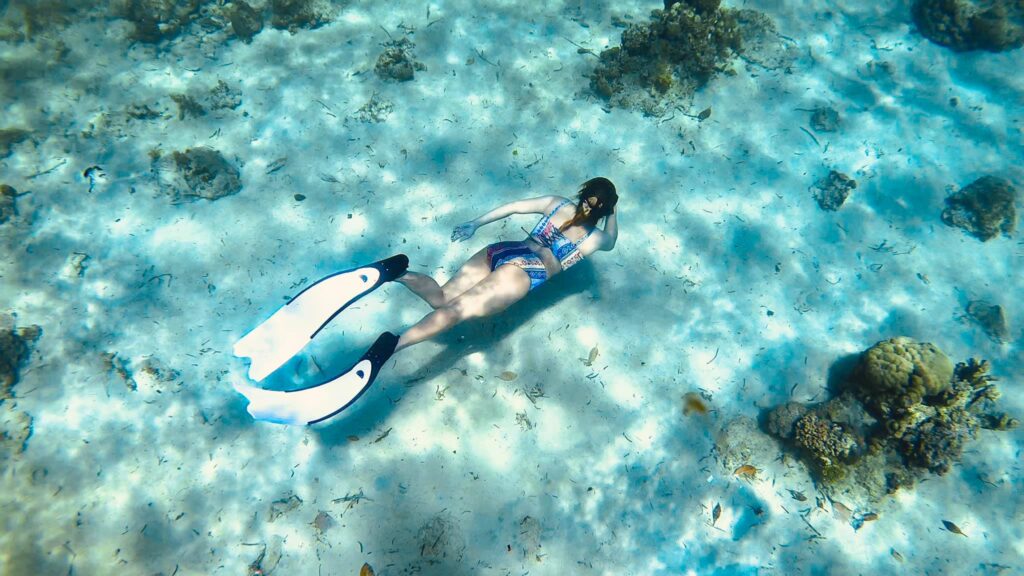
💡 While not everyone may experience the same outcomes, many divers report meaningful changes in their physical, mental, and emotional well-being through consistent freediving practice.
1. Physical Conditioning and Breath Control 🫁
Freediving involves deliberate breath-holding and movement underwater, which some studies suggest can help improve respiratory and muscular efficiency over time. According to a 2022 article published in the Journal of Clinical Medicine, breath-hold training can positively influence lung function and respiratory control in healthy adults, especially when done regularly and safely (PMC9517084).
Additionally, researchers observed that freedivers develop better muscle oxygen saturation and hemoglobin dynamics, which could support muscular endurance and oxygen economy during physical activity (MDPI, 2024). These adaptations are part of what some call the “freediver’s body memory”, an internal system that learns how to stay calm and efficient even in high-pressure environments.
Still, these benefits are gradual and vary depending on the diver’s consistency, experience, and baseline health.
2. Mental Clarity and Stress Regulation 🧠
Many freedivers describe the underwater experience as “meditative.” That’s not just poetic—it’s backed by psychology. A comparative study published on ResearchGate found that freediving athletes often exhibit lower levels of anxiety and stress compared to non-divers, likely due to the intense focus on breathing, body awareness, and present-moment mindfulness (ResearchGate Study).
Organizations like Molchanovs Freediving also point out how the practice can activate the parasympathetic nervous system, leading to a state of calm and restoration. Breathwork, a fundamental part of freediving, is also commonly used in therapeutic settings for anxiety and emotional regulation.
While freediving is not a replacement for professional mental health care, many find that it complements other wellness practices like meditation, yoga, or therapy.
3. Emotional Insight and Connection with Nature 🌊
Beyond the physical and psychological, there’s an emotional pull to freediving—something many divers struggle to explain, but never forget. Immersing yourself in the underwater world can foster a profound sense of connection with nature. As noted by Shearwater Research, freediving places you in direct, undisturbed contact with marine life, often leading to feelings of unity, humility, and awe.
This is echoed by Molchanovs, who describe the ocean as a natural therapy space, one that encourages mindfulness, emotional release, and personal growth. Being underwater without distractions can help some people reset mentally and emotionally, especially when modern life feels overstimulating.
Again, this connection is deeply personal. While some may feel transformed by the experience, others may simply enjoy the quiet, weightless moment without attaching any deeper meaning—and both are perfectly valid.
Can Anyone Try Freediving?
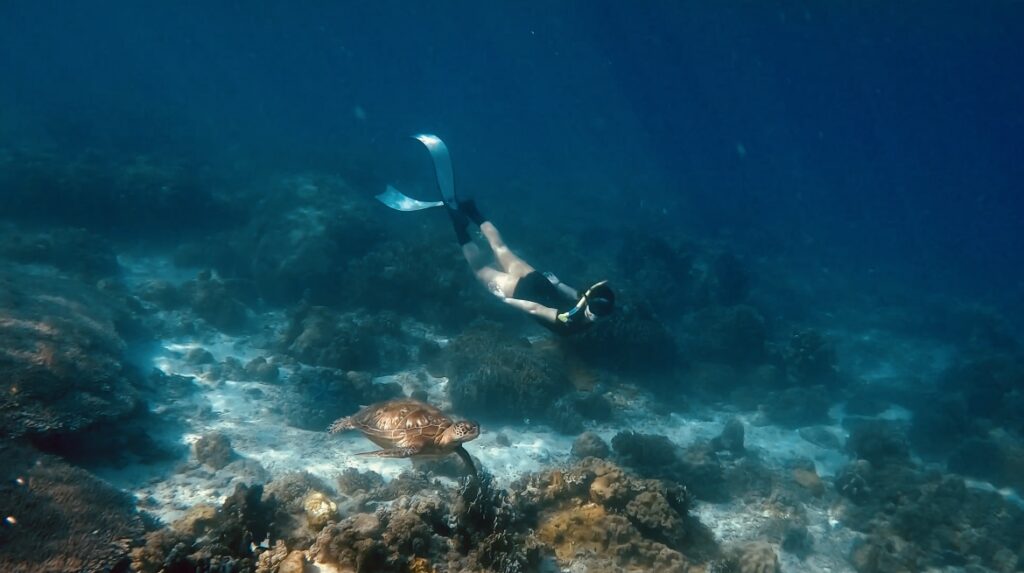
If the idea of holding your breath underwater makes you feel a little nervous, you’re not alone. One of the most common myths about freediving is that you have to be a pro swimmer, an athlete, or some kind of ocean goddess to even try it. That’s simply not true.
Freediving is accessible to most people, as long as you’re in good health and willing to learn. You don’t need to be an elite swimmer or have any fancy gear to start. In fact, many beginners start in calm, shallow waters with only a mask and fins, guided by certified instructors who prioritize safety above all.
That said, freediving isn’t something to take lightly. It’s not just about breath-holding, it’s about understanding how your body reacts to pressure, managing your mental state underwater, and always respecting the ocean. That’s why training is essential.
💡 Did you know? One of the core safety rules in freediving is to never dive alone. No matter your skill level, always have a buddy with you.
If you’re curious about trying it, look for beginner-friendly courses or discovery sessions with certified instructors. These intro lessons often include theory, breathing exercises, safety tips, and shallow water dives. Just enough to get a feel for the sport without going too far, too fast.
So if you’ve been watching freediving videos thinking, “I could never do that,” maybe it’s time to gently prove yourself wrong. Freediving isn’t about pushing limits. It’s about exploring your own.
Getting Started With Your First Freediving Journey
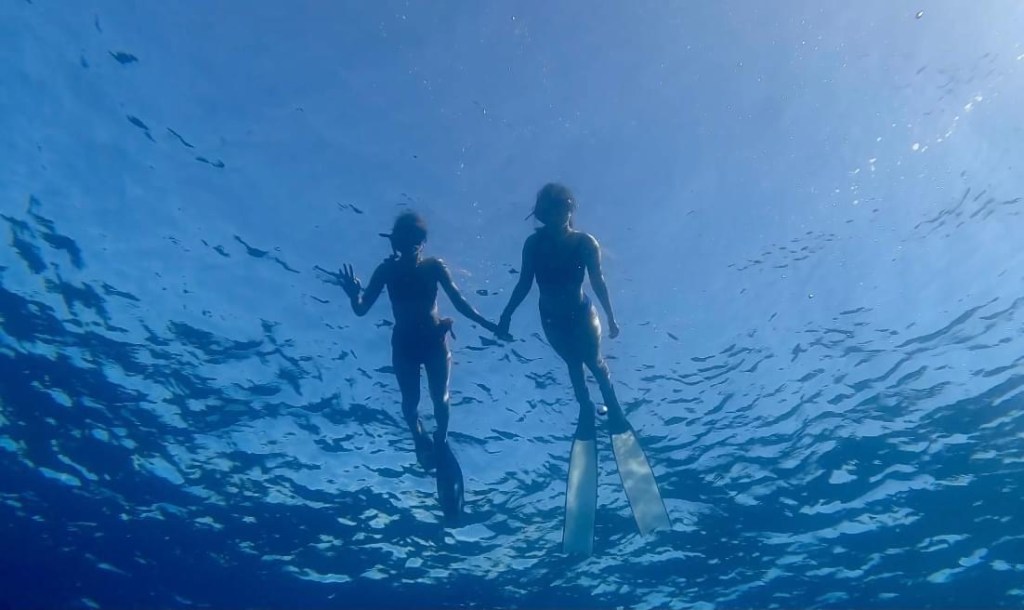
If freediving has been tugging at your curiosity, consider this your sign. You don’t need to wait until you’re “fit enough,” “ready enough,” or “less scared”. You just need a safe space to start and someone experienced to guide you.
There are plenty of freediving schools and instructors around the world, especially in coastal hubs like the Philippines, Thailand, Indonesia, and the Mediterranean. Whether you’re near coral reefs or just planning a beach trip, you can find intro classes designed specifically for beginners.
What to Expect in a Beginner Freediving Class:
-
A short theory session covering breathing, safety, and equalization
-
Breathing and relaxation techniques you can even use on land
-
A calm open water or pool session guided by a certified instructor
-
A focus on safety—not depth
💡 Tip: Look for instructors certified by AIDA, SSI, or Molchanovs, as they follow international standards and emphasize both technique and safety.
You’ll be surprised at how quickly your body adapts, how peaceful the underwater world feels, and how rewarding it is to step out of your comfort zone—one breath at a time.
Whether you go on to dive deep or just float in stillness beneath the surface, freediving might show you something you didn’t expect: not just what your body can do, but how powerful your mind can be when you learn to trust it.
To the quiet moments and the wild ones, see you soon!
Frequently Asked Questions About Freediving
Is freediving safe for beginners?
Freediving can be safe if learned properly through certified instructors and practiced with safety protocols. Beginners should always dive with a buddy, avoid pushing their limits, and stay within shallow depths during early sessions. Like any sport, the key is training, preparation, and respect for the ocean.
Do I need to be a strong swimmer to try freediving?
Not necessarily. Basic swimming skills are helpful, but you don’t need to be an expert. Freediving focuses more on breath control and body awareness than speed or stroke technique. Many freediving courses cater to non-swimmers and help build water confidence slowly.
What are the physical effects of breath-holding in freediving?
Holding your breath underwater activates the “mammalian dive reflex,” which slows your heart rate, conserves oxygen, and redirects blood to essential organs. Over time, breath-hold training may improve lung efficiency, cardiovascular control, and muscular endurance. However, effects vary from person to person.
Can freediving help with anxiety or stress?
Some people find that freediving improves mindfulness, lowers stress, and brings a sense of calm. The combination of controlled breathing, underwater stillness, and presence can mimic meditative effects. That said, it’s not a substitute for mental health care, but it can be a powerful complementary practice for some.
Is freediving the same as snorkeling?
Not quite. While both involve exploring underwater without scuba gear, freediving focuses on breath-hold techniques, diving deeper, and training the body and mind. Snorkeling usually keeps you at the surface with minimal breath-holding. Think of freediving as the deeper, more focused cousin of snorkeling.
How long does it take to learn freediving?
Most people can grasp the basics in just a few days. A beginner freediving course often includes one classroom session and one or two water sessions. With consistent practice, you’ll see improvements in breath-hold time, depth comfort, and overall relaxation underwater.
Where can I learn freediving in the Philippines?
The Philippines has some of the best beginner freediving schools in Asia, especially in places like Moalboal (Cebu), Panglao (Bohol), El Nido (Palawan), and Anilao (Batangas). Many offer intro sessions, certifications, and even accommodations near the water.
Related Reads
To the quiet moments and the wild ones, see you soon!

Stories That Travel with The Orange Mermaid ✨
I write for people like you, curious souls, quiet wanderers, and brave first-timers. If you’re craving real stories, personal travel guides, and a glimpse into what it’s like to travel the world as a solo female traveler, you’ll feel right at home at The Orange Mermaid.
With love and a carry-on,
Michelle

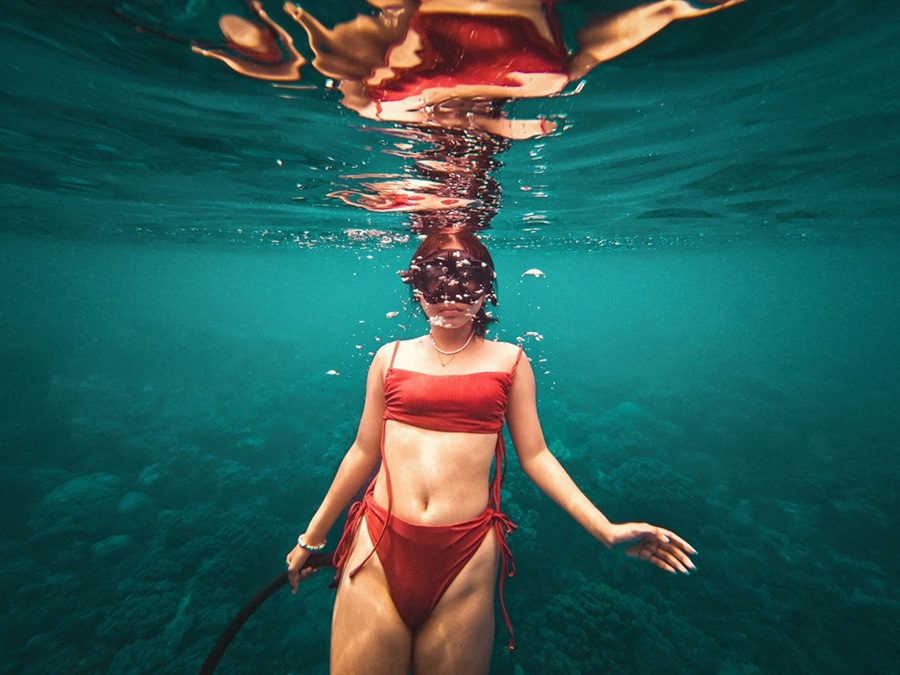
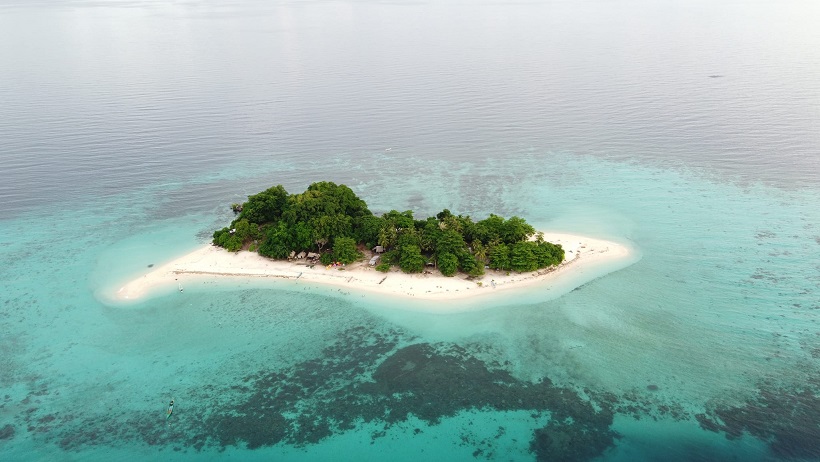
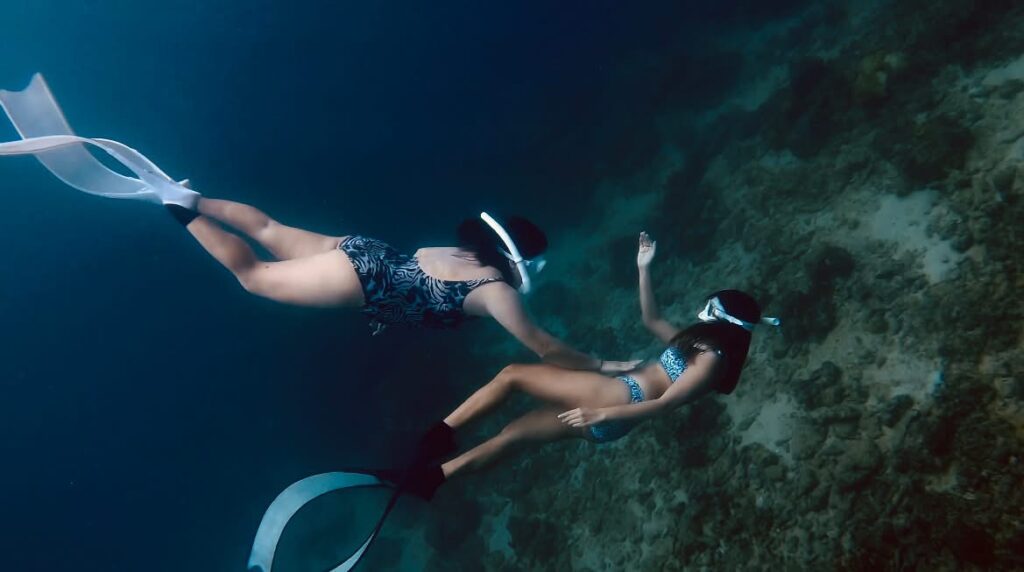

Wow !